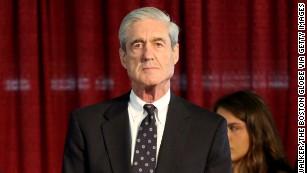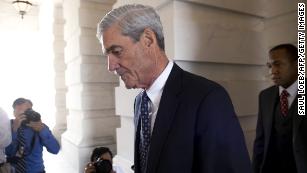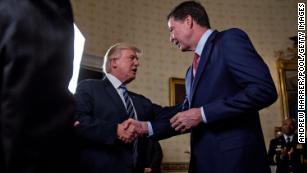EXCLUSIVE: Rosenstein consulted with ethics adviser at DOJ on Russia probe
(CNN)Deputy Attorney General Rod Rosenstein continues to oversee special counsel Robert Mueller's investigation after consulting with a career ethics adviser at the Justice Department about his ability to oversee the Russia probe, a source familiar with the matter tells CNN.
For nearly a year, legal experts and journalists have questioned why Rosenstein has not stepped aside from overseeing Mueller's investigation given that he was part of the dramatic firing of FBI Director James Comey. That fact has more recently served as ammunition to attack Rosenstein's credibility by allies of President Donald Trump.
But CNN has now learned that Rosenstein has consulted with the ethics adviser over the course of the investigation on whether he needs to recuse himself, and he has followed that individual's advice -- a fact which has not been previously reported and offers a more fulsome explanation for how he has continued to oversee Mueller's work. The source did not specify the number of conversations, timing, or the details of the advice.
To date, Rosenstein has offered little by way of explanation publicly, but he made clear last year that if he were to become a subject of Mueller's investigation, he would recuse himself.
"I've talked with Director Mueller about this," Rosenstein told the Associated Press. "He's going to make the appropriate decisions, and if anything that I did winds up being relevant to his investigation then, as Director Mueller and I discussed, if there's a need from me to recuse, I will."
The crux of the issue dates back to last May, when Rosenstein wrote a memo outlining ways Comey had flouted Justice Department protocols leading up to the 2016 election. Trump used the memo to justify firing Comey, but later told NBC "this Russia thing" was on his mind when he fired Comey, and he would have done it regardless of Rosenstein's memo.
Rosenstein's role in the episode has continually raised questions about how he has been able to oversee Mueller's investigation if it delves into potential issues of obstruction of justice.
Trump raised the issue early on, tweeting in June: "I am being investigated for firing the FBI Director by the man who told me to fire the FBI Director! Witch Hunt."
Those close to the President say leveraging the recusal as a way to undermine Rosenstein is a newfound approach for the White House team. Until recently, Trump's allies have not wanted to draw attention to the issue and thereby risk acknowledging that the President is under investigation for obstructing justice.
But after the FBI raid on the President's longtime attorney, Michael Cohen, the White House and Trump's outside allies have been increasingly engaged in finding ways to undermine Rosenstein.
"I don't think he can serve on an investigation in which he will end up being the key witness," lawyer and Trump friend Alan Dershowitz said on Fox News Wednesday evening. "I think Rod Rosenstein is recused."
But legal experts say the fact that Rosenstein consulted with an ethics adviser adds more legitimacy to his decision to stay on.
It "indicates that he is intent on doing things the right way," said CNN legal analyst Carrie Cordero, who served as senior associate general counsel at the Office of the Director of National Intelligence and an attorney adviser at the Justice Department.
"Based on how he has overseen the special counsel to date, and the fact that Attorney General Jeff Sessions recused himself on the advice of DOJ's ethics advisers, I'm inclined to think that if Rosenstein was advised by career officials that he needed to recuse himself from certain matters, he would do so," Cordero added.
Others have suggested that, at bottom, an obstruction investigation focuses on the President's mindset, not Rosenstein's, so his role in drafting the memo about Comey is inconsequential.
"The dismissal itself is a matter of public record," Georgetown Law Professor Marty Lederman wrote for the Just Security law blog. "And in light of Trump's own admissions about his desire to put a crimp in the Russia inquiry, it's not obvious that Mueller would have much to do in investigating that question other than to question Trump himself, something that apparently has not yet happened."
CNN's Evan Perez contributed to this report.





No comments:
Post a Comment